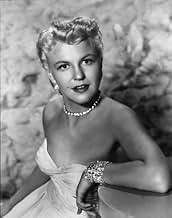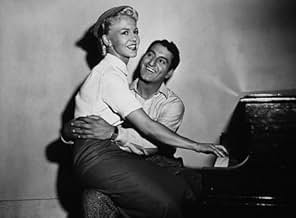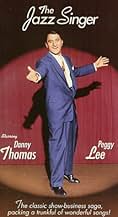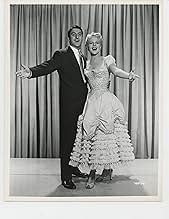अपनी भाषा में प्लॉट जोड़ेंJerry dreams of becoming a famous jazz singer, but to accomplish that, he must defy his father, a Jewish Cantor who opposes such a dream as a future for a son of his.Jerry dreams of becoming a famous jazz singer, but to accomplish that, he must defy his father, a Jewish Cantor who opposes such a dream as a future for a son of his.Jerry dreams of becoming a famous jazz singer, but to accomplish that, he must defy his father, a Jewish Cantor who opposes such a dream as a future for a son of his.
- 1 ऑस्कर के लिए नामांकित
- कुल 1 नामांकन
Murray Alper
- Taxi Driver
- (बिना क्रेडिट के)
Jimmy Ames
- Music Store Proprietor
- (बिना क्रेडिट के)
फ़ीचर्ड समीक्षाएं
Good grief.. to think I've seen it all.. Danny Thomas looks SO out of place in this mishmash. He seems really uncomfortable. He can't sing worth a lick, and when he's paired up with Peggy Lee (PEGGY LEE???) she easily.. EASILY outsings him! Maybe the director saw this and made him do the reall really bad comedy routines that he sometimes does in the film. Peggy Lee is okay, but the whole thing is a shambles. Good for a laugh, maybe.
Rich looking redo of the legendary Jolson film that revolutionized the film industry ushering sound in and silence out.
The thing is that it was the technology that was the big deal about the film not the story which is pure hokum. However that seems to be something that the studio chose to ignore assuming the name recognition of the title would draw the crowds. The film did okay but it's a cornball exercise from start to finish. The main story was dated in '27 and is certainly no fresher in '52.
Danny Thomas just didn't have the strength of personality to make it on the big screen. Watching him it becomes apparent why he made it on TV and not cinema. He has a nice, likable demeanor, the sort that worked so well for Perry Como and Dinah Shore when they likewise abandoned the big screen for the small, but he doesn't dominate his scenes the way a leading man has to. He does sing well although not nearly well enough to be the rage of New York he's supposed to be.
That master of all genres Michael Curtiz moves the movie along well enough but it's too schmaltzy for him to be able to make it really memorable.
Putting all that aside the best reason to catch the film is the presence of Peggy Lee in the cast. This was her acting debut and while she doesn't have the instantly easy relaxed acting style of Doris Day the role doesn't put big demands on her, she did much better a few years on in Pete Kelly's Blues. It doesn't matter though when she sings which fortunately is often. When she does that all the hokeyness melts away and the viewer is treated to a legend doing what she does best, sing. An extra bonus is that she performs one of her biggest hits, Lover, in an elegant club setting giving you an idea of what it was actually like to see her in person.
Worth catching for Miss Lee but the story is sappy.
The thing is that it was the technology that was the big deal about the film not the story which is pure hokum. However that seems to be something that the studio chose to ignore assuming the name recognition of the title would draw the crowds. The film did okay but it's a cornball exercise from start to finish. The main story was dated in '27 and is certainly no fresher in '52.
Danny Thomas just didn't have the strength of personality to make it on the big screen. Watching him it becomes apparent why he made it on TV and not cinema. He has a nice, likable demeanor, the sort that worked so well for Perry Como and Dinah Shore when they likewise abandoned the big screen for the small, but he doesn't dominate his scenes the way a leading man has to. He does sing well although not nearly well enough to be the rage of New York he's supposed to be.
That master of all genres Michael Curtiz moves the movie along well enough but it's too schmaltzy for him to be able to make it really memorable.
Putting all that aside the best reason to catch the film is the presence of Peggy Lee in the cast. This was her acting debut and while she doesn't have the instantly easy relaxed acting style of Doris Day the role doesn't put big demands on her, she did much better a few years on in Pete Kelly's Blues. It doesn't matter though when she sings which fortunately is often. When she does that all the hokeyness melts away and the viewer is treated to a legend doing what she does best, sing. An extra bonus is that she performs one of her biggest hits, Lover, in an elegant club setting giving you an idea of what it was actually like to see her in person.
Worth catching for Miss Lee but the story is sappy.
Oy gevalt! What a disaster! Danny Thomas croons (badly), Danny Thomas tells jokes (badly) that are so corny and ancient Al Jolson would have been embarrassed to crack them, Danny Thomas emotes (badly, almost laughably). Opening scene had me wondering what all those goyim were doing in the temple! Peggy Lee was entertaining and a standout in this otherwise dreary film. The supporting cast were more-or-less adequate, with the mother and father characters well cast. Look for character actor William Schallert in a bit part, along with some other familiar faces. The Technicolor photography was superb. Watch all the scenes taking place in clubs across the nation and you'll notice that Danny and Peggy are using the exact same microphone in each one! My advice - stick with Jolie's groundbreaking original.
By 1952 Hollywood decided to remake the Al Jolson first-talking classic.
This time the Cantor's son was played by Danny Thomas. Coming home from the army, it is expected that he follow in the footsteps of his father and other male relatives by becoming a cantor. However, young Mr. Golding has quite a zest for show business.
At this time, he meets Peggy Lee, an aspiring singer. She acts very well and her rendition of her favorite song, Lover, is remarkable. The film writers were smart not to plug the obvious Jewish guy and non-Jewish girlfriend relationship. If anything, this is glossed over. In his anger, for betraying his pledge to become a cantor, his father makes the traditional Jewish sign indicative of a loss in the family. This would not be done under circumstances of breaking a pledge, it would be done if among the orthodox, an inter-faith marriage would take place.
Thomas does a really good job of playing the cantor's son. His singing is up to par as the film ends on a positive note.
Am surprised that technical advisers did not realize that women do not carry pocketbooks into synagogue on the sabbath or at all during that period.
This time the Cantor's son was played by Danny Thomas. Coming home from the army, it is expected that he follow in the footsteps of his father and other male relatives by becoming a cantor. However, young Mr. Golding has quite a zest for show business.
At this time, he meets Peggy Lee, an aspiring singer. She acts very well and her rendition of her favorite song, Lover, is remarkable. The film writers were smart not to plug the obvious Jewish guy and non-Jewish girlfriend relationship. If anything, this is glossed over. In his anger, for betraying his pledge to become a cantor, his father makes the traditional Jewish sign indicative of a loss in the family. This would not be done under circumstances of breaking a pledge, it would be done if among the orthodox, an inter-faith marriage would take place.
Thomas does a really good job of playing the cantor's son. His singing is up to par as the film ends on a positive note.
Am surprised that technical advisers did not realize that women do not carry pocketbooks into synagogue on the sabbath or at all during that period.
Angels sing above the Temple Sinai in Philadelphia, while dashing Danny Thomas (as Jerry Golding) returns from service in the Korean War. Celebrating the Jewish New Year (Rosh Hashanah), Mr. Thomas' observant parents Eduard Franz and Mildred Dunnock (as David and Ruth) are proud of their son's honorable discharge. Father Franz retires as cantor at the Temple so that Thomas can take over the position. The family has served as cantor for six generations. However, Thomas has decided to break with tradition. He wants to pursue a secular career in show business. Mother Dunnock seems understanding, but father Franz is righteously indignant. Life is tough for Thomas, but having singing girlfriend Peggy Lee (as Judy Lane) around helps...
In a part played by George Jessel on Broadway (1925-1926) and Al Jolson in the movies (1927), Thomas has big shoes to fill. Although he recorded his songs, some of Thomas' dubbing doesn't look authentic. Also, he has stand-up comic skills far superior to the flat routines you see here, which are evident in his long career. Other than that, Thomas is convincing in the role...
While a little lax in the dramatic scenes, Ms. Lee is the film's main asset. Her voice is exquisite and, more importantly, she and director Michael Curtiz make each musical number feel like it belongs exactly where it appears in the script. Unfortunately, Lee's role has been revised to match the religion of Thomas' character. This weakens the story's central conflict (between Thomas and Franz). It looks spectacular in Technicolor, but we wonder why Thomas' parents live in a luxurious palace, where modestly-attired mother Dunnock stands out by refusing a fur coat and dressing like the help. A consistent best supporting actress, Dunnock and Mr. Curtiz make her mother role the most technically well-drawn, with her final scene wordlessly offering conflict resolution.
****** The Jazz Singer (12/30/52) Michael Curtiz ~ Danny Thomas, Peggy Lee, Mildred Dunnock, Eduard Franz
In a part played by George Jessel on Broadway (1925-1926) and Al Jolson in the movies (1927), Thomas has big shoes to fill. Although he recorded his songs, some of Thomas' dubbing doesn't look authentic. Also, he has stand-up comic skills far superior to the flat routines you see here, which are evident in his long career. Other than that, Thomas is convincing in the role...
While a little lax in the dramatic scenes, Ms. Lee is the film's main asset. Her voice is exquisite and, more importantly, she and director Michael Curtiz make each musical number feel like it belongs exactly where it appears in the script. Unfortunately, Lee's role has been revised to match the religion of Thomas' character. This weakens the story's central conflict (between Thomas and Franz). It looks spectacular in Technicolor, but we wonder why Thomas' parents live in a luxurious palace, where modestly-attired mother Dunnock stands out by refusing a fur coat and dressing like the help. A consistent best supporting actress, Dunnock and Mr. Curtiz make her mother role the most technically well-drawn, with her final scene wordlessly offering conflict resolution.
****** The Jazz Singer (12/30/52) Michael Curtiz ~ Danny Thomas, Peggy Lee, Mildred Dunnock, Eduard Franz
क्या आपको पता है
- ट्रिवियाMichael Curtiz originally wanted Doris Day to play the role of Judy Lane.
- गूफ़Catwalks, lights and other equipment rigged to the roof of the sound stage are clearly visible during a shot of an audience supposedly sitting in a real theater.
- कनेक्शनReferenced in Make Room for Daddy: Linda, the Performer (1960)
टॉप पसंद
रेटिंग देने के लिए साइन-इन करें और वैयक्तिकृत सुझावों के लिए वॉचलिस्ट करें
- How long is The Jazz Singer?Alexa द्वारा संचालित
विवरण
- रिलीज़ की तारीख़
- कंट्री ऑफ़ ओरिजिन
- भाषा
- इस रूप में भी जाना जाता है
- Jazz Singer
- फ़िल्माने की जगहें
- उत्पादन कंपनी
- IMDbPro पर और कंपनी क्रेडिट देखें
बॉक्स ऑफ़िस
- US और कनाडा में सकल
- $43,60,000
- चलने की अवधि1 घंटा 47 मिनट
- पक्ष अनुपात
- 1.37 : 1
इस पेज में योगदान दें
किसी बदलाव का सुझाव दें या अनुपलब्ध कॉन्टेंट जोड़ें






















